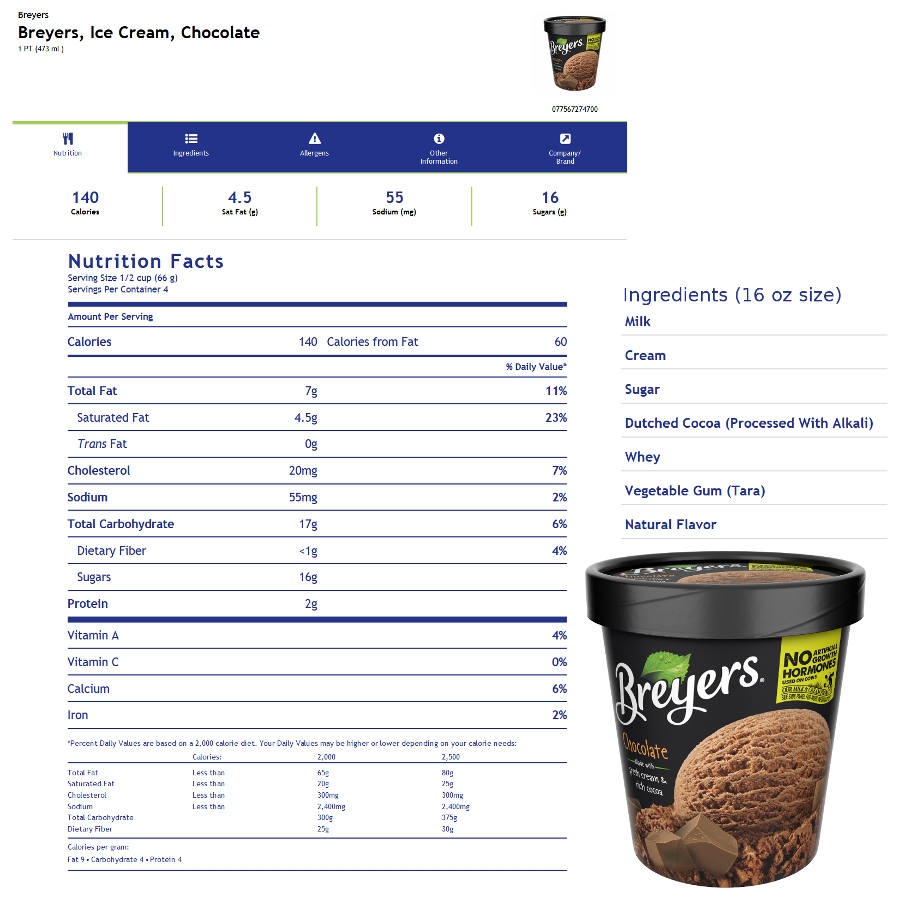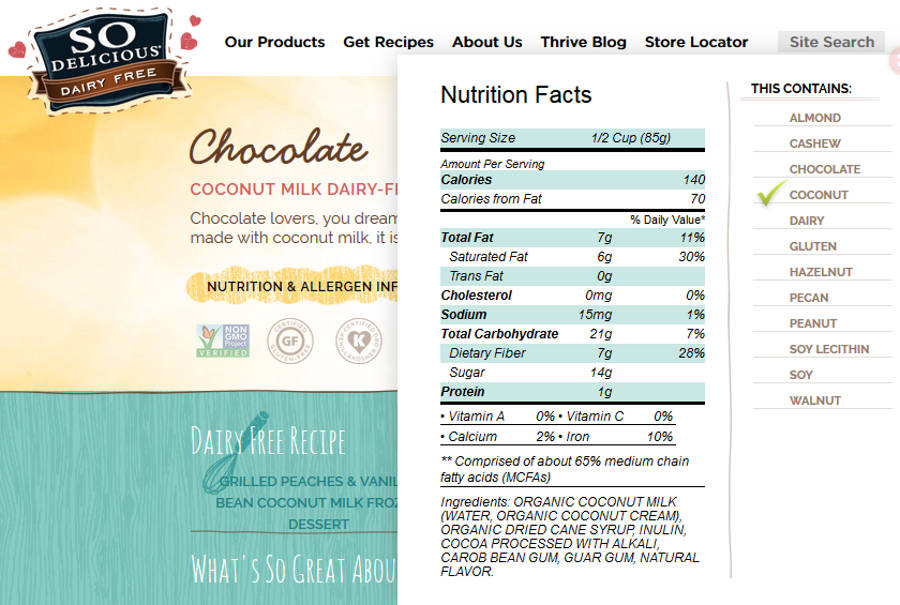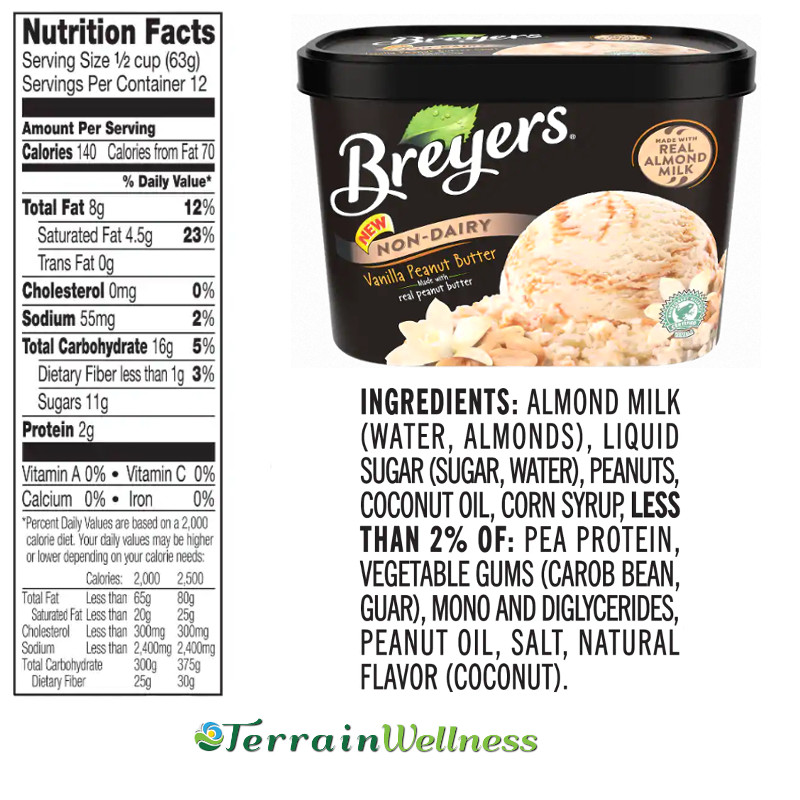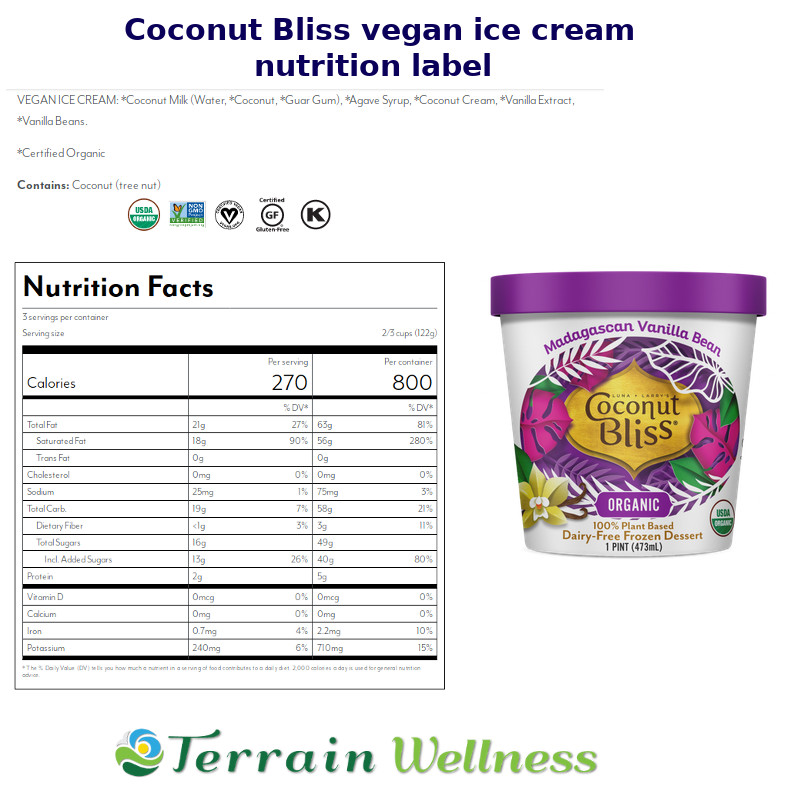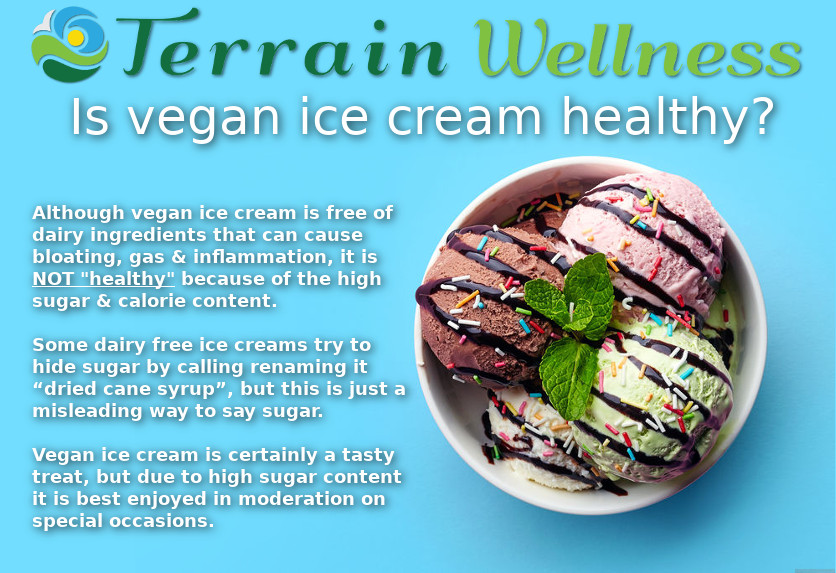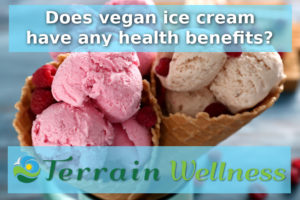Is non dairy or vegan ice cream healthier?
Many people assume that dairy-free or vegan ice creams are inherently healthier. However, in terms of calories, dairy free and vegan ice creams are often about the same as regular ice cream. That said, there are some benefits of dairy free ice cream in terms avoiding certain food ingredients and excess dairy, which has been linked to digestive issues and inflammation.
Ice Cream Nutrition Labels Compared
- serving size: 1/2 cup
- calories per serving: 140
- calories from fat: 60
- total fat: 7 grams
- saturated fat: 4.5 grams
- cholesterol: 20 milligrams
- sodium: 55 milligrams
- total carbohydrate: 17 grams
- protein: 2 grams
- source: Breyers Website
Breyers Ice Cream Nutrition Label:
(Dairy, cow’s milk ice cream)
- serving size: 1/2 cup
- calories per serving: 140
- calories from fat: 70
- total fat: 7 grams
- saturated fat: 6 grams
- cholesterol: 0 milligrams
- sodium: 15 milligrams
- total carbohydrate: 21 grams
- protein: 1 grams
- source: So Delicious Website
Coconut Milk Dairy-Free Ice Cream Nutrition Label:
- serving size: 1/2 cup
- calories per serving: 140
- calories from fat: 70
- total fat: 8 grams
- saturated fat: 4.6 grams
- cholesterol: 0 milligrams
- sodium: 55 milligrams
- total carbohydrate: 16 grams
- protein: 2 grams
- source: Breyers Website
Breyers Almond Milk Ice Cream Nutrition Label:
Is vegan ice cream healthier?
The shift toward natural, whole food ingredients in the foods we eat has helped our society in a number of ways. In terms of popularity, processed foods and artificial ingredients are OUT and simplified ingredients are IN. Consequently, this higher level of consciousness about the foods we eat and more awareness about what’s put into that food has helped many people experience significant benefits such as a healthier BMI (Body Mass Index) as well as an increased life satisfaction. At the Terrain Wellness Naturopathic & Integrative Medical Clinic in Portland, Oregon, we believe that healthy, conscious decisions goes hand-in-hand with loving ourselves and getting the most out of life. One way to do this is by making informed food choices that fit with our life goals. With this in mind, today we discuss non-dairy ice cream alternatives.
Non-dairy ice cream alternatives have been cropping up on store shelves in recent years boasting natural ingredients such as almond milk, soy, coconut milk and sweetened by fine sounding ingredients like “agave nectar” and “dried cane syrup” in lieu of sugar, dairy and the now-despised corn syrup. That said, a quick scan of the nutrition label quickly points out that many popular non-dairy offerings have similar calorie profiles as their more traditional milk-containing counterparts. When considering ice cream alternatives it is important to keep in mind that in terms of how much food energy your body will use or store as fat (calories and macro-nutrients), the calorie difference between the dairy and non-dairy ice cream may often be negligible or even non-existent.
Is Ice Cream Healthy Now?
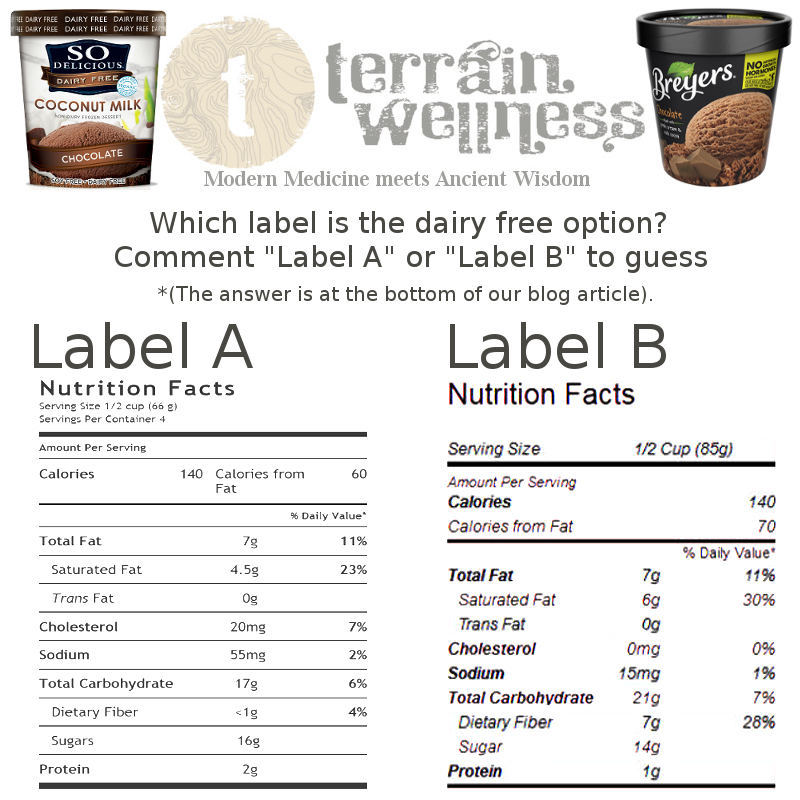
To the delight of ice cream lovers everywhere we can truthfully report that many of the popular ice cream alternatives taste awesome! However, as a Naturopathic Physician in Portland, Oregon I have mixed feelings about these types of foods. On the one hand, dairy ingredients can produce some undesirable effects in some people’s digestive system such as bloating, gas and may exacerbate unwanted inflammatory processes. However, I would still definitely categorize ice cream alternatives as a special treat to consume sparingly due to the high carbohydrate and calorie content. Furthermore, as outed by a recent NPR Article, the “dried cane syrup” listed in the Nutrition Facts of the ice cream alternative is just fancy talk for sugar. The facts about consuming large amounts of simple carbohydrates whether it’s plain old sugar, agave nectar or “(sugar) cane syrup” is that the body experiences a pronounced blood-sugar spike that puts an additional strain on the body’s endocrine system. Health care professionals are in very close agreement that excessive blood-sugar spikes are tied to weight-gain, diabetes and heart disease and premature aging.
Breyers Versus So Delicious
When we compared “So Delicious Chocolate Coconut Milk Dairy-Free Frozen Dessert” with “Breyers Chocolate (Ice Cream) Made With Fresh Cream & Rich Cocoa” we found that both have 140 calories per serving and both have 7 grams of fat. Reading deeper into the label will reveal a few minor differences in saturated fat and cholesterol content but in terms of calories, carbohydrates and fats the two choices are nearly identical. In addition, neither the ice cream nor the non-dairy alternative offer much in the way of nutritional benefits. Another point that deserves mentioning is that both Breyers and So Delicious is that both options have a very small serving size so it’s important to be aware of how many “servings” are actually being consumed.
Dairy vs vegan ice cream
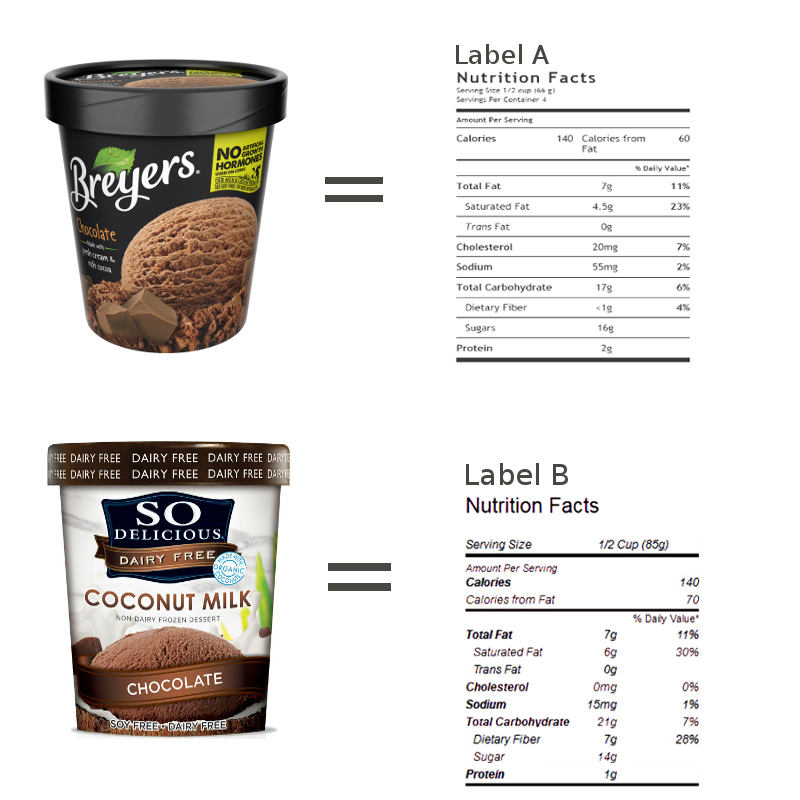
In reference to food, “macro(s)” are defined as the macro-nutrients in the foods we consume such as carbohydrates, fats and proteins. It’s important to note that macros define the basic building blocks of energy contained within the food we eat but that is not the whole picture for fitness. More natural, minimally processed foods like raw vegetables have immense health benefits and are also loaded with important vitamins, minerals and other organic substances that support a healthy body. With that disclaimer, being aware of macros is a good way to make sure your body is getting the right kind of energy and nourishment in ways that will support your health and fitness goals. Working with a naturopath about balancing the foods you eat to sustain the internal terrain of your body is an important step in being the best version of yourself. In my treatment of patients ranging from competitive athletes including distance runners, martial artists and rock climbers as well as normal people who want to lead a long and happy life I’ve found that each individual has very unique nutritional needs. For many people, being able to enjoy a cold treat on occasion adds joy and recreation to their lives. With that in mind, let’s learn to love ourselves by making sure that treats don’t supplant nourishing our bodies with foods that support health and vitality.
Health benefits of non-dairy/vegan ice cream
Ice cream alternatives do provide consumers with more choices by giving people the ability to avoid certain ingredients for health reasons. Also, I am very pleased that the natural foods movement has also led to both standard and alternative ice cream manufacturers being pressured to remove nasty ingredients like corn syrup and artificial dyes/flavors. Dairy ingredients can be problematic for some people in that they increase production of phlegm leading to increases in upper respiratory infections. Furthermore, eating too much dairy combined with the sugar of ice cream may also negatively influence gut flora health.
Nonetheless, it doesn’t take a naturopathic doctor to realize that food makers are using the natural food trend to market high-calorie desserts as “healthy” when in reality the calorie macro-nutrient profile is almost exactly the same as traditional ice cream. In short, what’s good for a company’s sales may not be the best health choice in foods. With temperatures quickly rising here in Portland, Oregon, we here at the Terrain Wellness Naturopathic Medical Clinic understand that a cool treat can be a fun way to cool off and escape the summer heat. But, we know our patients also value their healthy, active lifestyles and choose natural ingredients as a way of increasing life satisfaction. As a naturopathic doctor in Portland, I’m pleased that these all natural ice creams and non-dairy alternatives give people a greater awareness and control of the foods and ingredients they choose to eat. Nonetheless, just because something is non-dairy, organic or all natural doesn’t mean it should be our main course for dinner. With this in mind, the temptation to over-indulge is still out in the wilds on shelves and in freezer aisles so it’s important to keep in mind that if it tastes just like regular ice cream…. that may be because (calorie-wise) it is.
No matter what choices you make about the foods you eat, our hope goal as Naturopathic Physicians is for all people everywhere to live long and fulfilling lives while loving and accepting themselves and others.

